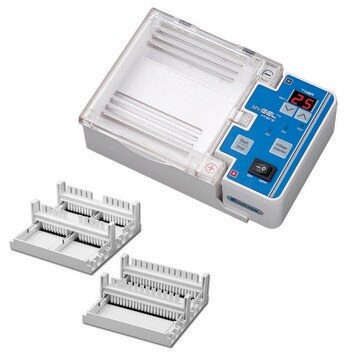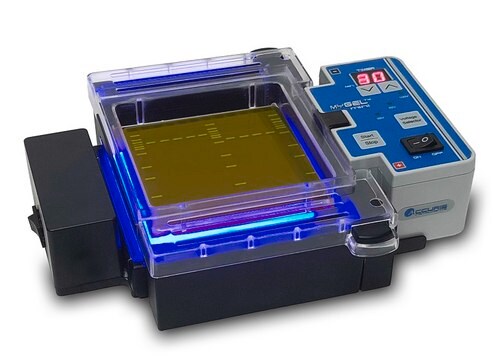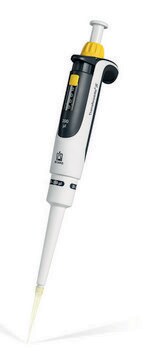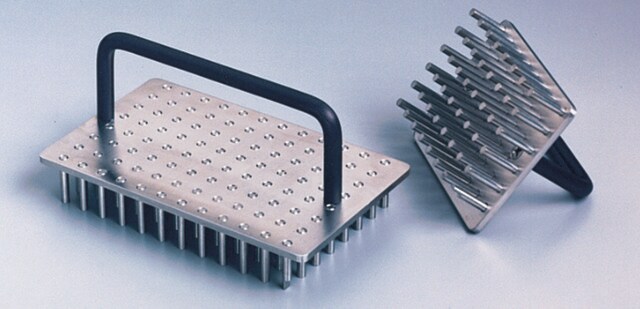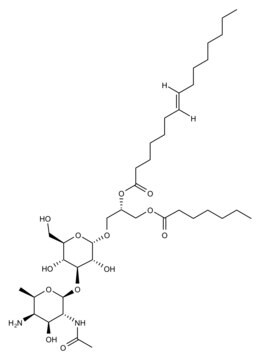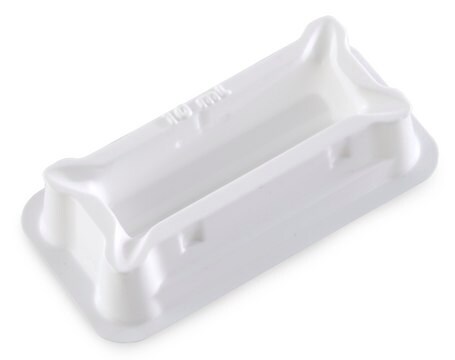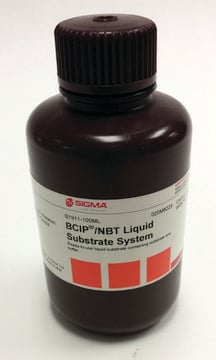GE28-9642-86
TempliPhi™ - 2000 Reaction Kit
Cytiva 28-9642-86
Zaloguj sięWyświetlanie cen organizacyjnych i kontraktowych
About This Item
Kod UNSPSC:
41116006
NACRES:
NA.85
Polecane produkty
producent / nazwa handlowa
Cytiva 28-9642-86
Warunki transportu
dry ice
temp. przechowywania
−70°C
Powiązane kategorie
Opis ogólny
TempliPhi™ Kits use a unique process to efficiently prepare micrograms of circular DNA from picogram input material. The DNA templates are prepared by rolling circle amplification (RCA) using bacteriophage Phi29 DNA polymerase. TempliPhi™ uses an isothermal method for the exponential amplification of circular DNA. Phi29 DNA polymerase is active at 30° C, enabling amplification to be performed at this temperature without the need for thermal cycling. The TempliPhi™ protocol requires less than 20 min of hands-on time to amplify 96 samples from bacterial colonies.
Two different types of TempliPhi™ DNA Amplification Kits are available to meet different throughput requirements. illustra™ TempliPhi™ DNA Amplification Kit for 2000 reactions contains premixed components and generates templates after overnight incubation. The 100- and 500-reaction kits contain separate, unmixed components for enhanced stability.
The illustra™ TempliPhi™ DNA Sequencing Template Amplification Kit has a distinct protocol and workflow compared to the 100/500 reaction size. Procedures for each kit are not interchangeable. Prior optimization is needed.
Two different types of TempliPhi™ DNA Amplification Kits are available to meet different throughput requirements. illustra™ TempliPhi™ DNA Amplification Kit for 2000 reactions contains premixed components and generates templates after overnight incubation. The 100- and 500-reaction kits contain separate, unmixed components for enhanced stability.
The illustra™ TempliPhi™ DNA Sequencing Template Amplification Kit has a distinct protocol and workflow compared to the 100/500 reaction size. Procedures for each kit are not interchangeable. Prior optimization is needed.
Zastosowanie
High-throughput preparation of circular DNA templates for cycle sequencing, cloning, and transformation.
Cechy i korzyści
- Prepare circular DNA templates for cycle sequencing, cloning, and transformation in 4 to 6 h.
- Generate microgram quantities of template DNA from picogram amounts of starting material.
- Use amplified DNA directly for cycle sequencing without purification.
- Amplify DNA from bacterial or M13 liquid cultures, colonies, plaques, glycerol stocks, or purified circular (plasmid or M13) DNA.
- Simple protocol reduces time, labor, and consumables needed for template preparation, and workflow enables easy automation.
Przechowywanie i stabilność
Please be aware this product may be shipped 30 days before the expiration date. For more information on the batch specific expiration date, please contact technical service.
S-re Denature buffer and control DNA at -70°C or -15°C - -30°C. S-re TempliPhi premix at -70°C. Do not s-re TempliPhi premix at -15°C - -30°C. Thaw the premix on ice and maintain at 0–4°C during handling. Do not allow premix - warm above 4°C prior - amplification
Komentarz do analizy
To view the Certificate of Analysis for this product, please visit www.cytiva.com.
Informacje prawne
TempliPhi
On packaging and insert for kits:
For use only as licensed by Qiagen GmbH. and Cytiva. The Phi 29 DNA polymerase may not be re-sold or used except in conjunction with the other components of this kit. See US patent numbers 5,854,033, 6,124,120, 6,143,495, 6,323,009, 5,198,543, 5,576,204, and their equivalents in other countries.
On container:
Subject to proprietary rights of Cytiva. May not be re-sold or used except with the other components of this kit. See US patent numbers 5,576,204, and their equivalents in other countries.
On packaging and insert for kits:
For use only as licensed by Qiagen GmbH. and Cytiva. The Phi 29 DNA polymerase may not be re-sold or used except in conjunction with the other components of this kit. See US patent numbers 5,854,033, 6,124,120, 6,143,495, 6,323,009, 5,198,543, 5,576,204, and their equivalents in other countries.
On container:
Subject to proprietary rights of Cytiva. May not be re-sold or used except with the other components of this kit. See US patent numbers 5,576,204, and their equivalents in other countries.
TempliPhi is a trademark of Cytiva
illustra is a trademark of Cytiva
Ta strona może zawierać tekst przetłumaczony maszynowo.
produkt powiązany
Numer produktu
Opis
Cennik
Kod klasy składowania
12 - Non Combustible Liquids
Certyfikaty analizy (CoA)
Poszukaj Certyfikaty analizy (CoA), wpisując numer partii/serii produktów. Numery serii i partii można znaleźć na etykiecie produktu po słowach „seria” lub „partia”.
Masz już ten produkt?
Dokumenty związane z niedawno zakupionymi produktami zostały zamieszczone w Bibliotece dokumentów.
Michael J Reagin et al.
Journal of biomolecular techniques : JBT, 14(2), 143-148 (2003-12-17)
Preparing plasmid templates for DNA sequencing is the most time-consuming step in the sequencing process. Current template preparation methods rely on a labor-intensive, multistep procedure that takes up to 24 h and produces templates of varying quality and quantity. The
Tracy L Meiring et al.
Virology journal, 9, 164-164 (2012-08-18)
Human papillomavirus (HPV) is the aetiological agent for cervical cancer and genital warts. Concurrent HPV and HIV infection in the South African population is high. HIV positive (+) women are often infected with multiple, rare and undetermined HPV types. Data
Nasz zespół naukowców ma doświadczenie we wszystkich obszarach badań, w tym w naukach przyrodniczych, materiałoznawstwie, syntezie chemicznej, chromatografii, analityce i wielu innych dziedzinach.
Skontaktuj się z zespołem ds. pomocy technicznej